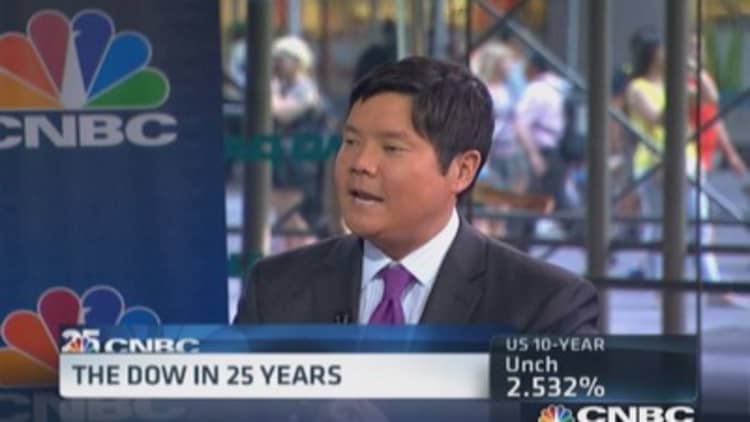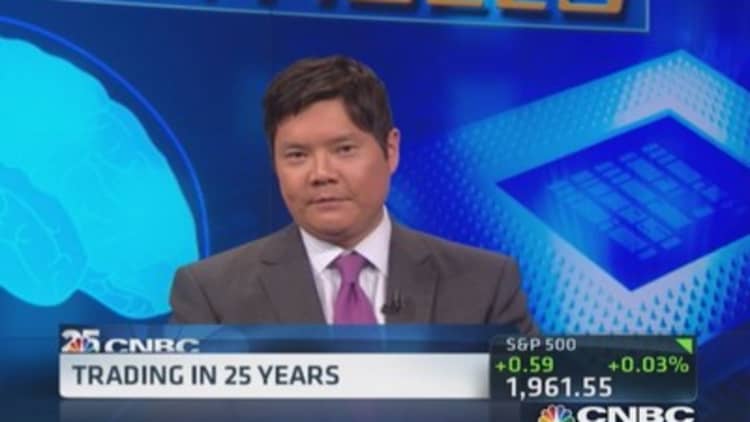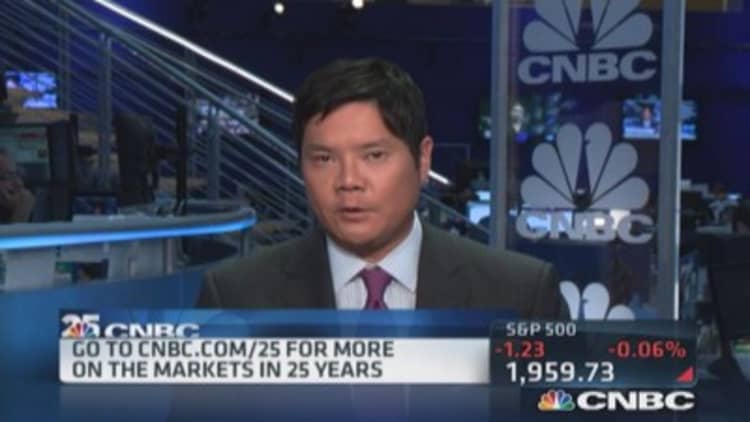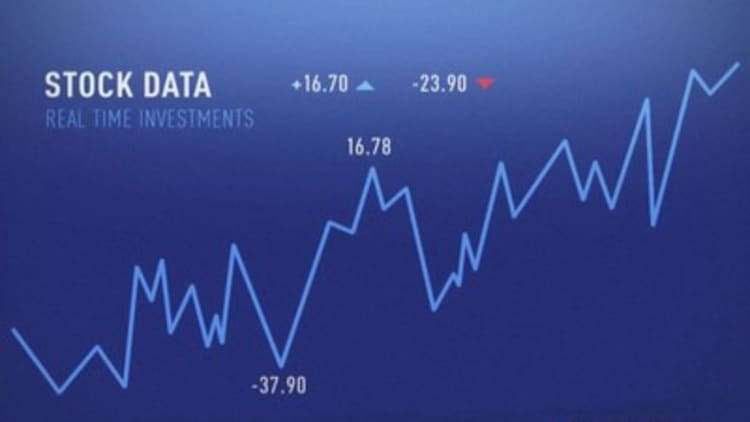In 1602 the Dutch East India Company opened the world's first stock exchange in Amsterdam. The new company was on its way to dominating the lucrative international trade in spices from the Far East, and it needed huge amounts of cash to finance its fleet of merchant ships.
Hence, the Amsterdam Bourse, which started life as an open-air market where traders could buy and sell the East India Company's stocks and bonds. Those traders soon invented the first derivative contracts, simple call and put options that gave them the right to trade shares in the future. Other companies started issuing shares on the Bourse, which moved to a handsome new building in 1611. Rival European capitals launched their own stock exchanges. The securitization of the world was under way.
Today the Amsterdam Bourse is a branch of Euronext, an exchange holding company that also operates the Brussels and Paris exchanges. Euronext, in turn, is owned by Atlanta-based IntercontinentalExchange (ICE), which operates a total of 23 exchanges around the world, including the venerable New York Stock Exchange, (NYSE), which it acquired late last year for $8.2 billion.
It's worth remembering the original Amsterdam Bourse because it established the template for the modern financial center, a physical place where finance professionals help companies access the capital they need to grow. Location obviously matters somewhat less in an era of exchange consolidation, globalized capital and 24/7 electronic trading. Even so, the complex infrastructure of modern finance is still clustered in a few major cities around the world.
"If you have a laptop and a satellite phone, you can trade from on top of a mountain," said Mark Yeandle, associate director of London's Z/Yen Group, which produces a biannual ranking of the world's top financial centers. "And yet people naturally want to cluster in cities near their clients and suppliers, even if they don't have to."
That's why Sunil Hirani chose New York City to launch trueEX, an electronic exchange for interest-rate swaps. Hirani sought to tap a new market opened up by the Dodd-Frank law, which requires swaps and other derivatives to be traded on regulated exchanges rather than over the counter. "New York makes sense for us," said Hirani. "The dealers and buy-side clients are all here, and you can get capital here."
Z/Yen's Global Financial Centres Index uses survey responses and other data to rank these cities according to such criteria as reputation, business environment, financial sector development, infrastructure and human capital. In the most recent index, published in March, New York City edged London out of the top spot for the first time since the first Z/Yen index launched in 2007, albeit by a statistically insignificant margin of two points in a 1,000-point index. Hong Kong, Singapore and Zurich rounded out the top five.
Read MoreWill Wall Street remain the financial capital of the world?
We're doing everything we could conceivably do to ruin our position as a primary source of financial transactions in the world.Dick Bovevice president, Rafferty Capital Markets
Why did London fall in the rankings? Yeandle points to the reputational black eye that London suffered over the LIBOR rate-manipulation scandal and more recent allegations of fraud in currency exchange markets, of which London is the global hub. Then there's uncertainty about the forthcoming U.K. general election, which could determine whether or not Britain remains in the European Union.
Another factor is the Scottish independence referendum coming up in September. That could actually wind up strengthening London as a financial center. If Scottish voters choose independence, major financial institutions like the Royal Bank of Scotland and Scottish Widows might well move their headquarters to London, simply because the Scottish economy is too small for an independent Scottish government to bail them out in the event of another financial crisis.
Although financial payrolls have risen modestly in both New York City and London since the Great Recession, most of the new jobs have been in regulatory compliance. Among financial professionals, this fuels perceptions that both cities are becoming overregulated without necessarily reducing fraud. One London bank director told the Z/Yen survey team that the big banks are spending tens of millions more on compliance without feeling any safer.
In the United States, aggressive enforcement actions, such as the Justice Department's current effort to extract a $10 billion fine from BNP Paribas for allegedly evading U.S. trade sanctions against Iran and other countries, have fueled fears that the U.S. is becoming fundamentally less hospitable to finance.
Read MoreThe US dollar to reign supreme for decades to come
"We're doing everything we could conceivably do to ruin our position as a primary source of financial transactions in the world," said the reliably outspoken Dick Bove, vice president of equity research at Rafferty Capital Markets. "The Justice Department went after Paribas for doing business with countries that the U.S. doesn't like. What does that do to the mentality of foreign nations being hit?"
Financial Centers on the Rise
| Centers likely to become more significant | Number of mentions |
|---|---|
| Casablanca | 68 |
| Busan | 58 |
| Singapore | 47 |
| Hong Kong | 37 |
| Shanghai | 36 |
| Dalian | 30 |
| Seul | 22 |
| Dubai | 20 |
| Luxembourg | 18 |
Source: Source: "The Global Financial Centres Index 2014”
Regulatory creep aside, financial capital is increasingly flowing to developing markets in Asia because that's where the economic growth is. About 32 percent of global financial flows went to emerging economies in 2012, according to the McKinsey Global Institute, up from 5 percent in 2002. McKinsey recently predicted that 1.8 billion people will join the consuming class by 2025, nearly all of them in emerging markets. And the firm expects emerging markets consumers to spend $30 trillion annually by 2025, up from $12 trillion a year today.
All that sounds like good news for emerging Asian financial centers like Shanghai, Seoul and Kuala Lumpur, as well as established powerhouses like Hong Kong and Singapore. And yet there are good reasons to think that New York and London will continue to be major financial players for the foreseeable future. For one thing, the language of international finance is still English, not Mandarin. New York and London are both attractive, cosmopolitan cities with liquid capital markets and large concentrations of financial expertise. Crucially, both cities offer functioning legal systems where contracts can be enforced.
"That's one of the reasons why so many Russian contracts are done in London," says Ruben Lee, CEO of Oxford Finance Group and author of the recent book "Running the World's Markets: The Governance of Financial Infrastructure." He added, "It's also why we've seen huge influxes of Russian, Middle Eastern and Chinese capital into London and New York."
Read MoreThe bank of the future
The freewheeling, decentralized nature of modern finance also tends to make authoritarian governments uncomfortable, which is another reason to doubt that Shanghai and other emerging Asian centers will supplant New York and London anytime soon.
"I don't see the Chinese authorities being that tolerant of the speculative and manipulative ways of Wall Street, especially since they can ill afford tremendous economic volatility within their own borders," said Ann Lee (no relation to Ruben), an expert on the Chinese economy and author of "What the U.S. Can Learn from China."
It's already clear that there will be many financial centers around the world in 25 years. In addition to capital supermarkets like New York, London and Hong Kong, we're already seeing the emergence of smaller centers that specialize in particular sectors: Calgary for energy finance; Busan, South Korea, for marine industry finance; Nairobi and Johannesburg for African capital markets.
So where will the financial capital of the world be in 2039? Ultimately, the markets will make that call. As they say on Wall Street, past performance does not guarantee future results.
—By Richard McGill Murphy, special to CNBC.com









